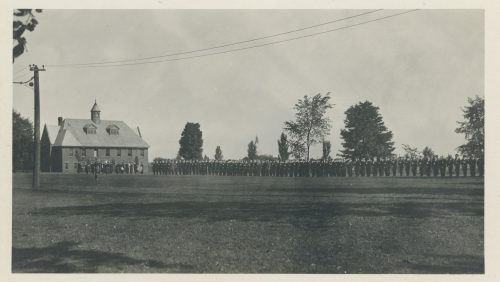Two Institutions Mark Milestones in Their Global Reach
Bicentennial Essay by Garth Myers, Paul E. Raether Distinguished Professor of Urban International Studies and Director of the Center for Urban and Global Studies.

It is not a coincidence that Trinity College is celebrating its 200th year at the exact same time that the Connecticut World Affairs Council is celebrating its 100th anniversary. The latter organization was actually founded at Trinity by two faculty members. Indeed, the first formal president of the then-named Foreign Policy Association of Hartford in 1930, was the interim president of Trinity College, Professor Henry A. Perkins.
For an entire century, Trinity and the Connecticut World Affairs Council have shared a mission of “helping the community navigate the global world we live in,” said Megan Torrey, CEO of the council. This remarkable span of time shares a great deal of global crisis points (some of them in the very same places) and a rising current of isolationism in American society, with the world at the time of the council’s founding in the 1920s.
In its early years, the Foreign Policy Association of Hartford focused its attention on Japan and Europe as tensions rose in the interwar years, culminating, of course, in World War II. The council has always been “at the forefront of history,” noted Torrey. Dr. Robins Barstow, the council’s president during World War II, beautifully distilled an enduring tenet of the organization’s mission: to “create a well-informed public regarding international affairs and seek wisdom and clear vision through unbiased objective analysis and give constructive interpretation of history in its making.” That goal endured through the postwar era, as global attention shifted to the USSR, the rise of Communism in China, the Cold War, the Nuclear Age, and the decolonization of much of Asia, Africa, and the Caribbean.
In 1952, the council then began a long era of sponsorship for the Model United Nations along with its “Great Decisions” lecture series. According to Torrey, “businesspeople, schoolteachers, university professors, and other pillars of the community” have been central to the life of the organization. The council went through a few name changes before settling on its current moniker. It became the World Affairs Center in 1967, and the World Affairs Council several decades later.
Regardless of its name, the Connecticut World Affairs Council has hosted some of the biggest names on the world stage throughout the past century. The roster of speakers is full of key players in world affairs including presidents, other national leaders, journalists, and luminaries. The list includes Mary Robinson, president of Ireland; George H.W. Bush, U.S. president; Henry Kissinger, American diplomat; Alexander Haig, U.S. secretary of state; Abraham Ribicoff, Connecticut governor and secretary of health, education, and welfare; Cokie Roberts, longtime journalist; and David Petreaus, former CIA director. Current CIA Director William Burns will be the featured speaker for the 100th Anniversary celebration at Goodwin College on April 19, 2024.
In addition to the “Great Decisions” lecture series and the Model United Nations, the Connecticut World Affairs Council has held a prominent Global Security Forum and granted a long-cherished “Luminary Award” for many years. The organization has overcome many financial challenges, most recently through the global Covid-19 pandemic, and – thanks in no small measure to Torrey’s widely-regarded leadership – it has become even stronger. The council recently merged with the World Affairs Forum in Fairfield County. It continues to enjoy strong relationships with many “pillars of the community” in greater Hartford and across the state, including the major corporations, civic leaders, universities, and colleges of the region.
Importantly, the ties with Trinity are woven through time. The founding director of the College’s Center for Urban and Global Studies, Professor Xiangming Chen, and current director, Professor Garth Myers, have served on the executive board of council. Trinity and the Connecticut World Affairs Council are close partners in combatting isolationism. Over the last 17 years, the linchpin of this connection has been Trinity’s Center for Urban and Global Studies, which has also been a steadfast financial partner. And, Trinity students and faculty have been regular participants in the events. It is an exciting time for the partnership, as we contemplate where we can go in the next 100 years.